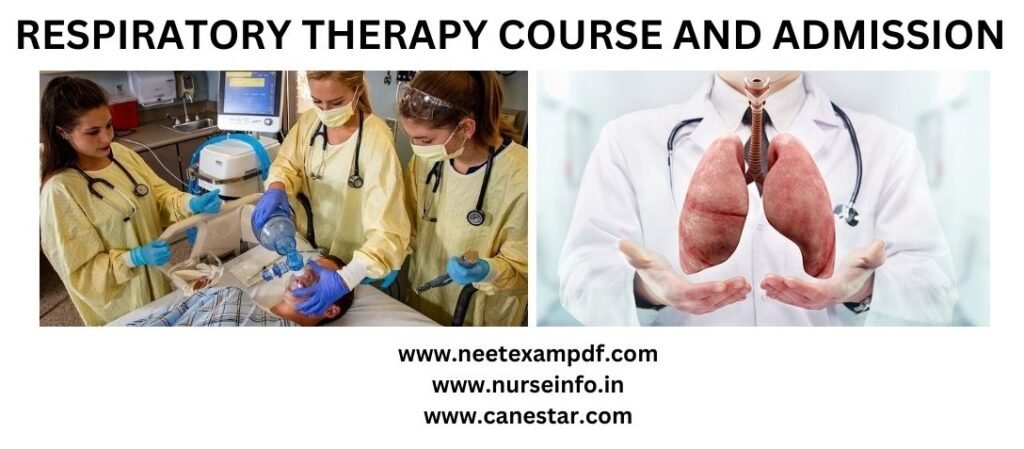RESPIRATORY THERAPY COURSE – COURSE, ELIGIBILITY, DURATION, COURSE CURRICULUM, FEE STRUCTURE, CAREER OPPORTUNITY (ABROAD) AND SALARY
COURSE
Respiratory therapy is a specialized healthcare profession that involves the evaluation, treatment, and care of patients with respiratory and cardiopulmonary disorders. In India, respiratory therapy is a relatively new field, and the availability of formal courses and programs may vary.
To pursue a respiratory therapy course in India, you can consider the following options:
- Bachelor’s Degree in Respiratory Therapy: Some universities and colleges in India offer a 4-year Bachelor’s degree program in respiratory therapy. The curriculum typically includes subjects like anatomy, physiology, pathology, pharmacology, respiratory care techniques, and clinical practice.
- Diploma in Respiratory Therapy: There are also diploma courses available in respiratory therapy. These programs are usually shorter in duration, ranging from 1 to 2 years. They provide basic training in respiratory care techniques and clinical practice.
- Master’s Degree in Respiratory Therapy: If you already have a bachelor’s degree in a related field, you may consider pursuing a master’s degree in respiratory therapy. However, master’s programs specifically in respiratory therapy may be limited in India.
ELIGIBILITY
The eligibility criteria for respiratory therapy courses in India can vary depending on the institution and the specific course you are interested in. However, here are some general eligibility requirements that are commonly observed:
- Bachelor’s Degree in Respiratory Therapy:
Candidates must have completed 10+2 or equivalent examination from a recognized board.
The qualifying examination should have included subjects such as Physics, Chemistry, and Biology (or Mathematics) as core subjects.
Minimum aggregate marks required may vary from institution to institution.
- Diploma in Respiratory Therapy:
Candidates must have completed 10+2 or equivalent examination from a recognized board.
Some institutions may have specific age requirements.
Minimum aggregate marks required may vary.
- Master’s Degree in Respiratory Therapy:
Candidates must have a bachelor’s degree in respiratory therapy or a related field from a recognized university.
Minimum aggregate marks required may vary.
DURATION
The duration of respiratory therapy courses in India can vary depending on the level of the course and the institution offering it. Here are the general durations for different levels of respiratory therapy courses:
- Bachelor’s Degree in Respiratory Therapy: The duration of a Bachelor’s degree program in respiratory therapy is typically 4 years. It includes both theoretical coursework and practical training.
- Diploma in Respiratory Therapy: Diploma courses in respiratory therapy are generally shorter in duration compared to a Bachelor’s degree program. They typically range from 1 to 2 years, depending on the specific course and institution.
- Master’s Degree in Respiratory Therapy: If you choose to pursue a Master’s degree in respiratory therapy, the duration can range from 1 to 2 years, depending on the institution and the specific program.
COURSE CONTENT
The specific course content of a respiratory therapy program can vary slightly between institutions. However, here is a general overview of the subjects and topics that are commonly covered in respiratory therapy courses:
- Basic Sciences:
Anatomy and physiology of the respiratory system
Pathophysiology of respiratory disorders
Pharmacology related to respiratory care
Microbiology and infection control
- Respiratory Care Techniques:
Principles of oxygen therapy and administration
Airway management techniques (including intubation and suctioning)
Mechanical ventilation and ventilator management
Pulmonary function testing
Chest physiotherapy and airway clearance techniques
Non-invasive respiratory support (such as CPAP and BiPAP)
Emergency respiratory care and resuscitation
- Clinical Practice and Patient Management:
Assessment and evaluation of patients with respiratory disorders
Monitoring and interpretation of vital signs and respiratory parameters
Treatment planning and implementation
Patient education and counseling
Management of acute and chronic respiratory conditions
Rehabilitation and long-term care for respiratory patients
- Professional and Ethical Considerations:
Medical ethics and legal aspects of respiratory care
Infection control practices and patient safety
Communication and teamwork skills
Documentation and record-keeping
Professional development and continuing education
FEE STRUCTURE
BSC., Respiratory therapy course fee is about 50,000 to 3 lakhs.
MSC., Respiratory therapy course fee is around 4 lakhs
CAREER OPPORTUNITY
Respiratory therapy offers a range of career opportunities both in India and globally. As a respiratory therapist, you can work in various healthcare settings, including hospitals, clinics, rehabilitation centers, and home healthcare. Here are some career opportunities in respiratory therapy:
- Respiratory Therapist: This is the primary role for individuals with a respiratory therapy background. As a respiratory therapist, you will assess, diagnose, treat, and manage patients with respiratory and cardiopulmonary disorders. You will administer respiratory treatments, manage ventilators, conduct pulmonary function tests, and educate patients on proper respiratory care.
- Intensive Care Unit (ICU) Respiratory Therapist: ICU respiratory therapists work in critical care units and provide specialized respiratory care to critically ill patients. They assist in managing ventilators, perform advanced airway management techniques, and collaborate with other healthcare professionals to ensure optimal patient outcomes.
- Pulmonary Function Technologist: Pulmonary function technologists specialize in conducting and interpreting pulmonary function tests (PFTs). They assess lung capacity, measure lung function, and assist in diagnosing respiratory conditions. They work closely with physicians and respiratory therapists to evaluate and monitor patients’ lung health.
- Sleep Technologist: Sleep technologists specialize in diagnosing and treating sleep-related breathing disorders, such as sleep apnea. They conduct sleep studies, monitor patients overnight, and assist in the treatment of sleep disorders through the use of devices like Continuous Positive Airway Pressure (CPAP) machines.
- Research and Education: With further specialization or higher education, respiratory therapists can pursue careers in research or education. They can contribute to respiratory therapy advancements, participate in clinical trials, or teach aspiring respiratory therapists in academic institutions.
- Management and Administration: Experienced respiratory therapists may move into management or administrative roles within healthcare organizations. They can oversee respiratory therapy departments, develop protocols and policies, and ensure quality respiratory care services.
SALARY
The salary of respiratory therapists in India can vary based on factors such as qualifications, experience, location, and the employing institution. Salaries can also differ between government and private healthcare sectors.
On average, the starting salary for respiratory therapists in India can range from approximately INR 2,00,000 to INR 4,00,000 per year. With experience and specialization, respiratory therapists can earn higher salaries, ranging from around INR 4,00,000 to INR 8,00,000 or more per year.
SALARY ABROAD
The salary of respiratory therapists can vary significantly from country to country due to differences in healthcare systems, cost of living, and demand for respiratory therapy services. Here are some approximate salary ranges for respiratory therapists in a few countries:
- United States: In the United States, respiratory therapists have favorable salary prospects. The average annual salary for respiratory therapists in the US is around $60,280. However, salaries can vary depending on factors such as experience, location, and the employing institution.
- Canada: In Canada, the average annual salary for respiratory therapists ranges from CAD 55,000 to CAD 80,000. Salaries may vary based on the province, level of experience, and the type of healthcare institution.
- United Kingdom: In the United Kingdom, the salary for respiratory therapists can range from £24,907 to £48,000 per year. The exact salary can depend on factors such as experience, location, and the employing institution within the National Health Service (NHS).
- Australia: In Australia, respiratory therapists typically earn an annual salary ranging from AUD 55,000 to AUD 85,000. Salaries can vary depending on experience, location, and the type of healthcare facility.
If you need more information, comment us below or email us.
Thank you.

